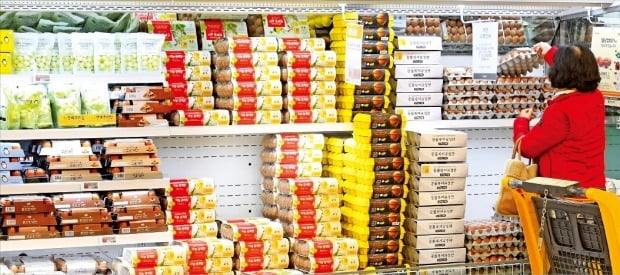
Due to the cold wave and the spread of avian influenza (AI), prices for eggs, chicken, and rice are rising ahead of the Lunar New Year next month. On the 17th, a consumer is browsing the egg corner at E-Mart in Seongsu-dong, Seoul. Reporter Eun-gu Kang [email protected]
Ahead of the Lunar New Year, the price of the table is rising in all directions. Not only the prices of agricultural products such as cabbage, radish, onion, but also livestock products such as chicken, egg, and samgyeopsal are showing a double-digit increase compared to the previous year. As the price of processed products is fluctuating, not only the price of the table, but also the cost of the New Year’s turn are concerned. Although the government is barely blocking the rise in retail prices by jointly holding a discount event with the distribution industry, inflation pressure is expected to continue for the time being.
The price of the table
The’Palm Air·Hankyung Korea Agricultural Product Price Index (KAPI)’, which comprehensively shows the trend of wholesale prices of domestic agricultural products, is hitting the highest level since three months. The 17th also recorded 182, up 3.69% from the previous day. The prices of the five seasoned vegetables, which the government intensively manages, such as Chinese cabbage (35%), radish (34%), red pepper (90%), garlic (9%), and onion (34%), were particularly strong.
Rice prices are also high. Retail prices of domestic rice soared from last year’s rainy season. The price of rice (based on 20 kg), which remained at 51,000 won until June of last year, rose to 52,000 won at the end of July and then exceeded 60,000 won in December. As of this month, the average retail price has been maintained at 59800 won. According to the Korea Rural Economic Institute, rice production last year was 3.5 million tons, down 6.4% from the previous year. It is the lowest production in 52 years.
Livestock prices are also rising. Egg and chicken prices have risen significantly due to the spread of highly pathogenic avian influenza (AI). As of the 16th, the retail price of one egg (based on 30 special eggs) was 6184 won. The price is up 9.8% from the previous month and 16.8% from the same month last year. The retail price of 1kg of chicken is 9.3% higher than the same month last year. As domestic demand increased, the average price of pork belly reached 2,116 won per 100g this month, 22% higher than the same period last year.
New Year’s gift fruit set increased by 20~30%

According to the distribution industry on the 17th, the price of fruit sets for New Year’s gifts sold in department stores and hypermarkets rose 20-30% from last year. This is because the price of apples and pears, which are mainly used in gift sets, has risen by nearly 50% from last year. According to the Korea Agricultural and Fishery Food Distribution Corporation (aT), on the 15th, 10 kg of product-grade Fuji apples were traded at a wholesale market for 62,300 won. This is a 52.9% increase from last year (4,720 won). The price of pears of reported varieties (based on 10 kg) also rose by 30%.
Processed food prices are also wriggling. Food companies are raising prices due to rising costs. Pulmuone decided to increase the price of tofu by up to 14% and bean sprouts by up to 10% during this month. Pulmuone’s domestic soybean tofu (300g) product, currently in the late 4000 won range, is expected to exceed 5,000 won sooner or later. An official of Pulmuone said, “Last year, due to the rainy season and heavy rain, soybean production has plunged by nearly 20%, resulting in a 15% rise in raw material prices.” “We are adjusting prices with distributors.”
On the 18th, Sampyo Foods will also raise prices for four types of saury and mackerel canned products by an average of 42%. On the 5th, Sampyo also raised the price of canned products such as sesame leaves, rice sprouts, and quail roe by an average of 36%.
Government prepares for inflationary measures
The movement of the government and the distribution industry to reduce the impact of soaring inflation is also accelerating. Ahead of the Lunar New Year, the government plans to expand the supply of major sacred products and come up with measures to stabilize livestock prices. It is reported that the government is planning to consider urgently importing eggs and chicken from foreign countries if the supply and demand collapse due to the severe AI and the price rises due to this.
Earlier, a total of 14 distributors, including the Ministry of Food, Agriculture, Forestry and Fisheries, a hypermarket, and an online mall, started the’Let’s go to Korea’s agricultural discount (agricultural product discount)’, a program to boost consumption of agricultural products. Agricultural products with large price hikes such as cabbage, radish, and eggs will be sold at a discount until the 27th. As the recent inflation movement was unclear, the event that was originally scheduled to start on the 28th was advanced by 15 days.
Reporter Kiman Kim/Bora Kim/Yoojung No [email protected]
